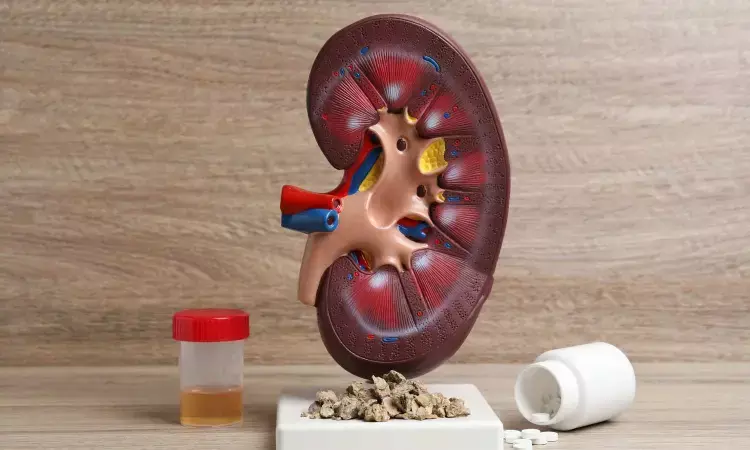- Home
- Medical news & Guidelines
- Anesthesiology
- Cardiology and CTVS
- Critical Care
- Dentistry
- Dermatology
- Diabetes and Endocrinology
- ENT
- Gastroenterology
- Medicine
- Nephrology
- Neurology
- Obstretics-Gynaecology
- Oncology
- Ophthalmology
- Orthopaedics
- Pediatrics-Neonatology
- Psychiatry
- Pulmonology
- Radiology
- Surgery
- Urology
- Laboratory Medicine
- Diet
- Nursing
- Paramedical
- Physiotherapy
- Health news
- Fact Check
- Bone Health Fact Check
- Brain Health Fact Check
- Cancer Related Fact Check
- Child Care Fact Check
- Dental and oral health fact check
- Diabetes and metabolic health fact check
- Diet and Nutrition Fact Check
- Eye and ENT Care Fact Check
- Fitness fact check
- Gut health fact check
- Heart health fact check
- Kidney health fact check
- Medical education fact check
- Men's health fact check
- Respiratory fact check
- Skin and hair care fact check
- Vaccine and Immunization fact check
- Women's health fact check
- AYUSH
- State News
- Andaman and Nicobar Islands
- Andhra Pradesh
- Arunachal Pradesh
- Assam
- Bihar
- Chandigarh
- Chattisgarh
- Dadra and Nagar Haveli
- Daman and Diu
- Delhi
- Goa
- Gujarat
- Haryana
- Himachal Pradesh
- Jammu & Kashmir
- Jharkhand
- Karnataka
- Kerala
- Ladakh
- Lakshadweep
- Madhya Pradesh
- Maharashtra
- Manipur
- Meghalaya
- Mizoram
- Nagaland
- Odisha
- Puducherry
- Punjab
- Rajasthan
- Sikkim
- Tamil Nadu
- Telangana
- Tripura
- Uttar Pradesh
- Uttrakhand
- West Bengal
- Medical Education
- Industry
Metabolic syndrome may increase prevalence of kidney stones

China: A recent study published in Translational Andrology and Urology has found metabolic syndrome (MetS) to be an independent risk factor for kidney stones.
The researchers, therefore, suggest that controlling MetS may help lower the incidence of kidney stones. MetS is a collection of clinical syndromes which are closely connected to hyperglycemia, obesity, dyslipidemia, and hypertension. It is a group of risk factors that are linked to metabolism.
Kidney stone is a common urological disease that affects people worldwide. There has been a gradual rise in the incidence of kidney stones in recent years with the great changes in people's diet structure and lifestyle, with a global prevalence of 7.2–7.7%. Several studies have shown that metabolic syndrome, obesity, race, and age were all associated with an increased prevalence of kidney stones.
At the same time, there has been a year-by-year increase in MetS prevalence. Some studies have shown a strong link between metabolic syndrome and kidney stones, and each component of MetS raised the risk of kidney stones separately. Despite this, not many large-scale cross-sectional studies have linked MetS and kidney stones.
Therefore, Liangli Chen, Sir Run Run Shaw Hospital, School of Medicine, Zhejiang University, Hangzhou, China, and colleagues conducted a cross-sectional study to determine the relationship between MetS components and kidney stones in a health screening population.
For this purpose, the researchers recruited subjects who underwent health checkups in the Health Promotion Centre of Sir Run Run Shaw Hospital of Zhejiang University between January 2017 and December 2019. It included 74,326 participants aged 18 or older, including 56.1% of men.
The diagnostic criteria of MetS were based on the joint statement of the International Diabetes Federation (IDF) and other associations on MetS in 2009.
The study led to the following findings:
- There were 33.4% of patients with MetS and 2.7% of patients with kidney stones.
- The prevalence of kidney stones was 3.3% in subjects with MetS and 2.4% in subjects without MetS.
- The odds ratio for kidney stones in MetS patients was 1.157.
- The prevalence of kidney stones showed a statistically significant trend of gradual increase as the number of MetS components increased.
- Among the components of MetS, elevated waist circumference, reduced high-density lipoprotein cholesterol (HDL-C), and elevated fasting blood glucose (FBG) were independent influencing factors of kidney stones, with odds ratios of 1.205, 1.222 and 1.335, respectively.
"Our findings revealed that MetS is an independent risk factor for kidney stones, and kidney stones risk increased with the increase in the number of MetS components," the researchers wrote. "Among the five MetS components low HDL-C, elevated waist circumference, and elevated blood glucose were independent influencing factors of kidney stones."
"Therefore, more attention should be paid to the treatment and prevention of MetS, which may be helpful to correct urinary tract metabolic abnormalities, thus leading to prevention of kidney stones," they concluded. "Future large-scale cohort studies will be done to test this hypothesis."
Reference:
Chen L, Zhang J, Shen K, Zhu Y, Zhang J, Pan J, Chen L. Kidney stones are associated with metabolic syndrome in a health screening population: a cross-sectional study. Transl Androl Urol. 2023 Jun 30;12(6):967-976. doi: 10.21037/tau-23-51. Epub 2023 Jun 9. PMID: 37426600; PMCID: PMC10323452.
4
Dr Kamal Kant Kohli-MBBS, DTCD- a chest specialist with more than 30 years of practice and a flair for writing clinical articles, Dr Kamal Kant Kohli joined Medical Dialogues as a Chief Editor of Medical News. Besides writing articles, as an editor, he proofreads and verifies all the medical content published on Medical Dialogues including those coming from journals, studies,medical conferences,guidelines etc. Email: drkohli@medicaldialogues.in. Contact no. 011-43720751


